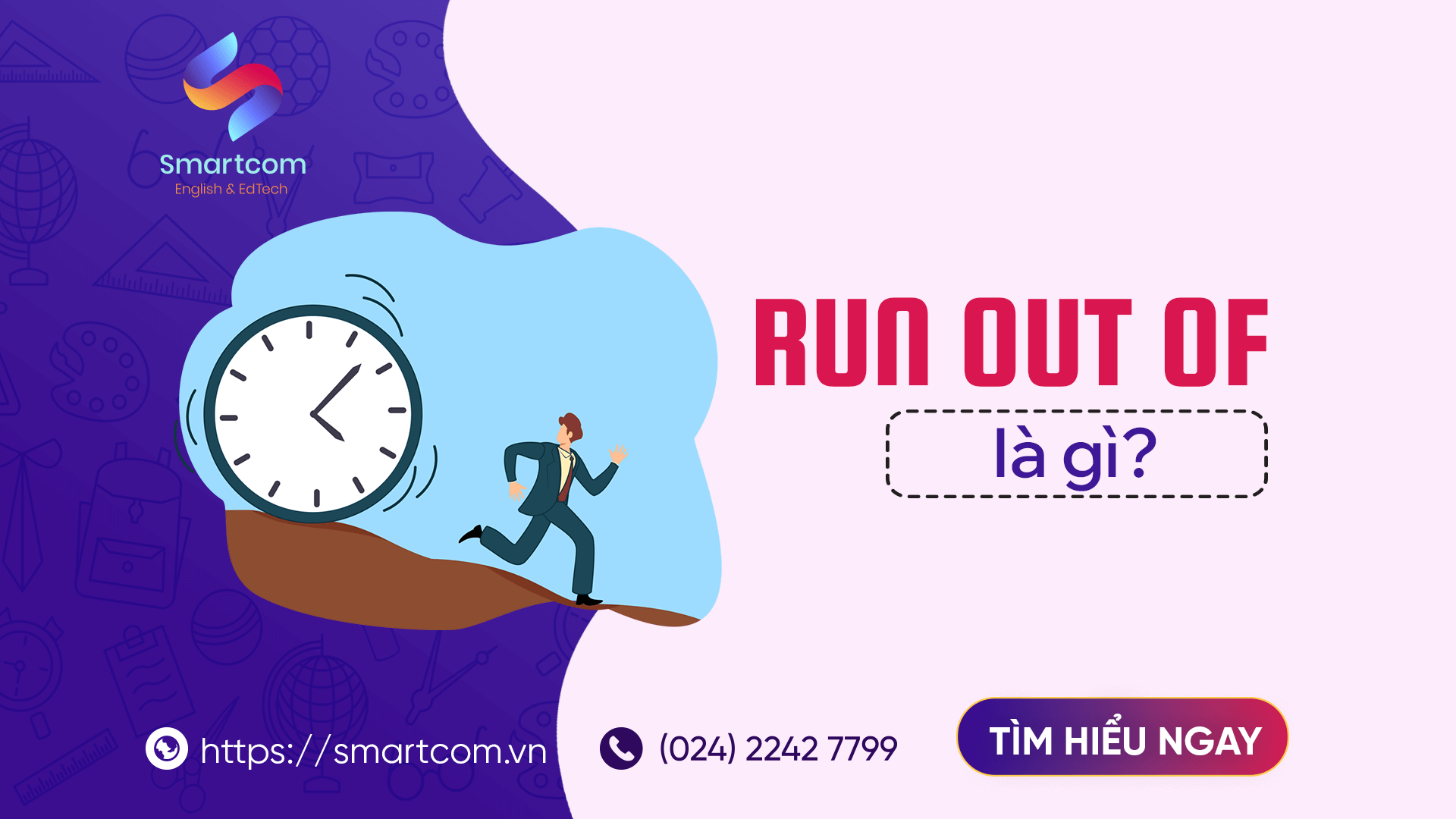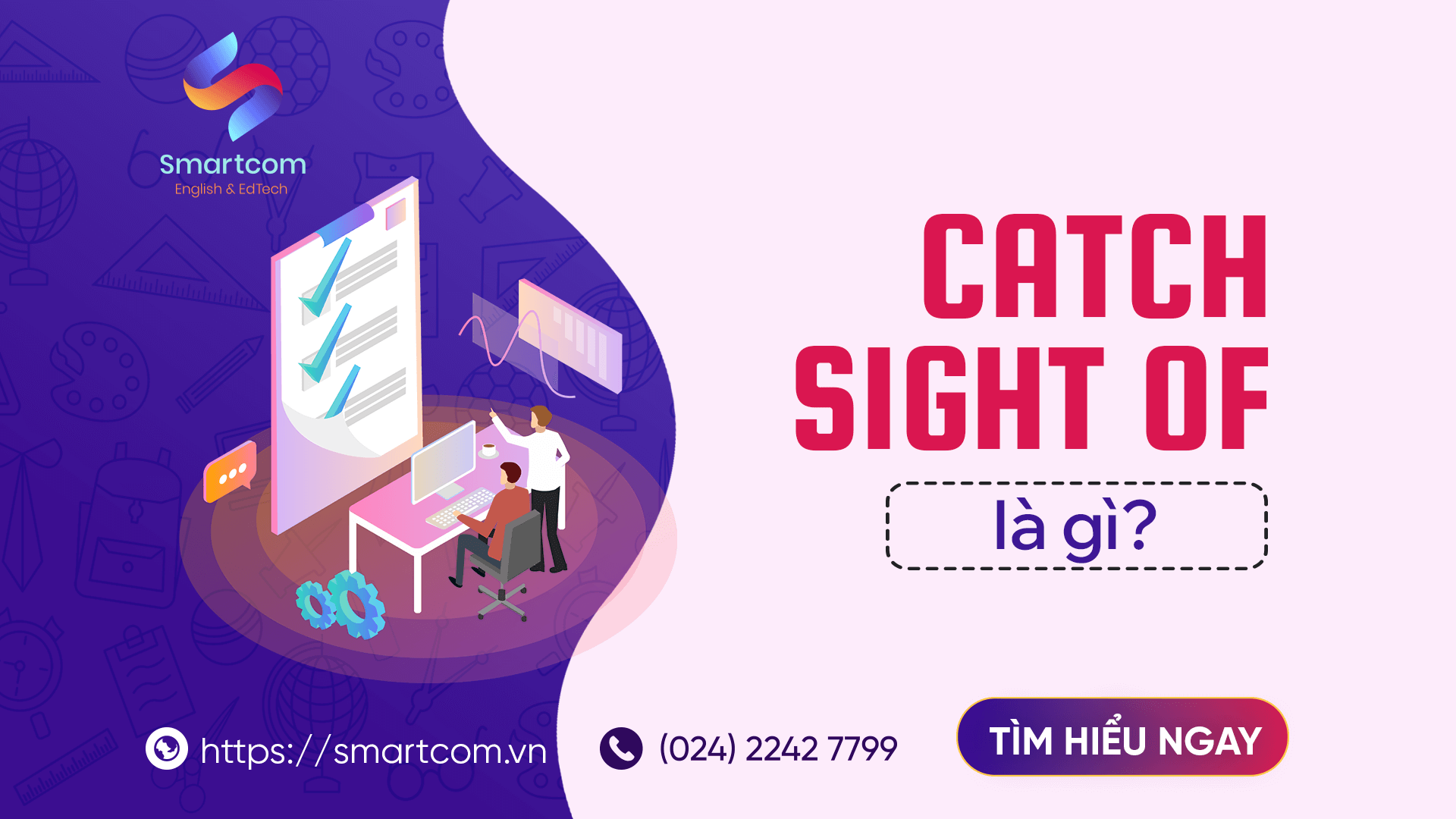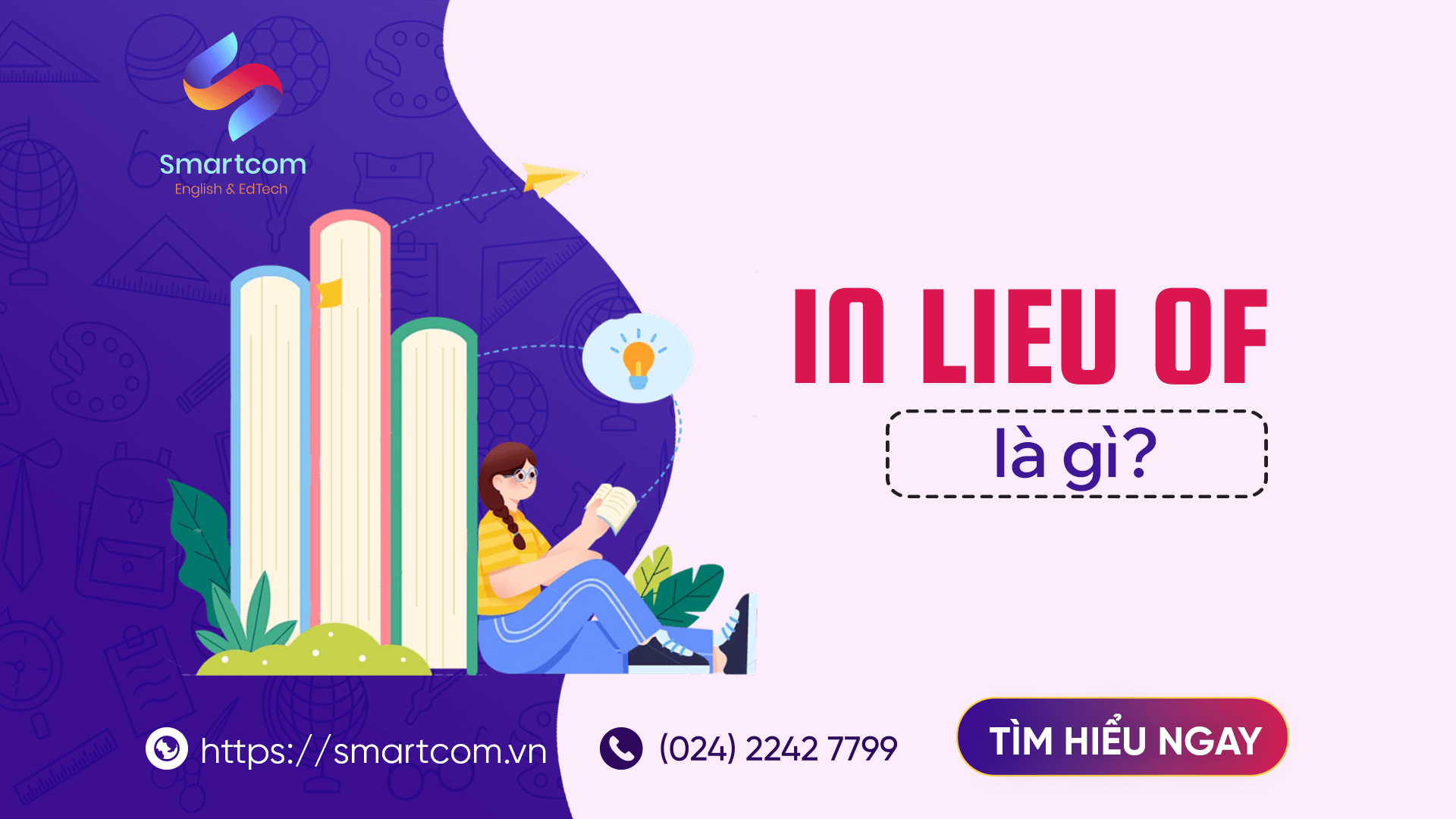Đội ngũ chuyên gia tại Smartcom English là tập hợp những chuyên gia đầu ngành trong lĩnh vực IELTS nói riêng và tiếng Anh nói chung. Với phương pháp giảng dạy sáng tạo, kết hợp với công nghệ AI, chúng tôi mang đến những trải nghiệm học tập độc đáo và hiệu quả. Mục tiêu lớn nhất của Smartcom Team là xây dựng một thế hệ trẻ tự tin, làm chủ ngôn ngữ và sẵn sàng vươn ra thế giới.
Trong bài thi IELTS, chủ đề Technology – The Internet là nội dung không hề xa lạ đối với các thí sinh. Khả năng trình bày trôi chảy trong chủ đề này không chỉ đòi hỏi kiến thức về công nghệ mà còn cần bạn có một kho từ vựng phong phú. Nắm chắc được hai yếu tố này, bạn sẽ không chỉ giao tiếp tự nhiên hơn mà còn có thể đạt band điểm cao hơn ở tiêu chí Lexical Resource. Hãy cùng Smartcom English tham khảo một số IELTS Vocabulary Topic Technology – Internet và câu trả lời gợi ý cho IELTS Speaking Part 3 nhé!
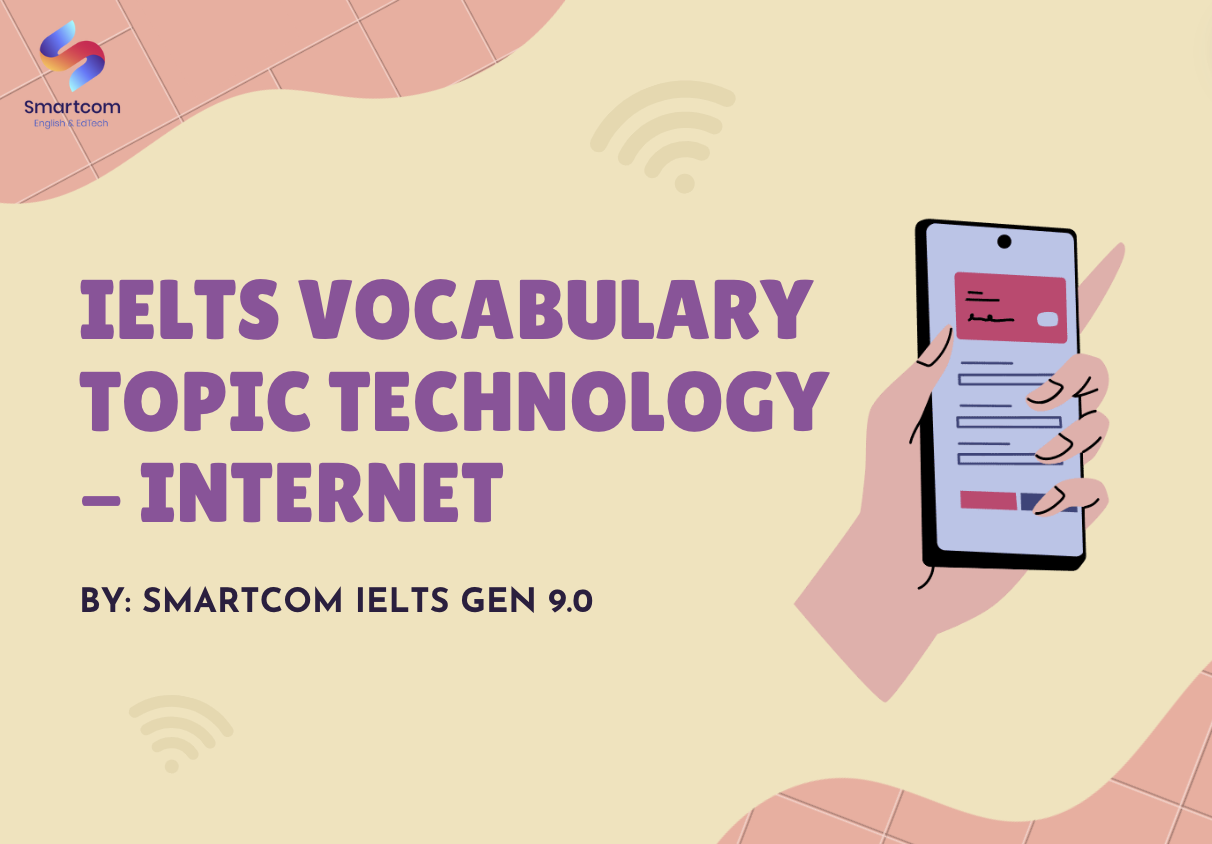
Tổng hợp IELTS Vocabulary Topic Technology – The Internet
IELTS Vocabulary Topic Technology: Internet Infrastructure
- Bandwidth /bændwɪdθ/ – Băng thông
- Broadband /brɔːdbænd/ – Băng thông rộng
- Connectivity /kɒnɛkˈtɪvɪti/ – Kết nối
- Data /deɪtə/ – Dữ liệu
- Data centers /deɪtə ˈsɛntəz/ – Trung tâm dữ liệu
- DNS (Domain Name System) /diːɛnˈɛs (ˈdəʊmeɪn neɪm ˈsɪstəm)/ – Hệ thống tên miền
- Firewall /faɪəwɔːl/ – Tường lửa
- Gateway /ɡeɪtweɪ/ – Cổng
- Internet backbone /ɪntəˌnet ˈbækˌbəʊn/ – Mạng lõi
- IP Address /aɪ piː ˈædrɪs/ – Địa chỉ IP
- Network /nɛtwɜːk/ – Mạng
- Protocol /prəʊtəkɒl/ – Giao thức
- Server /sɜːvə/ – Máy chủ
- Wi-Fi /waɪ faɪ/ – Wi-Fi (Kết nối Internet không dây)
IELTS Vocabulary Topic Technology: Online Communication
- Blogging /blɒɡɪŋ/ – Viết blog
- Chatrooms /ʧætˌruːmz/ – Phòng trò chuyện
- Cyber engagement /saɪbər ɪnˈɡeɪʤmənt/ – Tham gia trực tuyến
- Digital correspondence /dɪdʒɪtl ˌkɒrɪˈspɒndəns/ – Trao đổi số
- Digital discourse /dɪdʒɪtl ˈdɪskɔːs/ – Cuộc trò chuyện số
- Email /iːmeɪl/ – Email, gửi email
- Instant messaging /ɪnstənt ˈmɛsɪʤɪŋ/ – Nhắn tin nhanh, tức thời
- Microblogging /maɪkrəʊˌblɒɡɪŋ/ – Blog vi mô, viết blog ngắn gọn
- Online communities /ɒnˌlaɪn kəˈmjuːnɪtiz/ – Cộng đồng trực tuyến
- Online discourse /ɒnˌlaɪn ˈdɪskɔːs/ – Trò chuyện trực tuyến
- Online forums /ɒnˌlaɪn ˈfɔːrəmz/ – Diễn đàn trực tuyến
- Real-time communication /rɪəl-taɪm kəˌmjuːnɪˈkeɪʃən/ – Giao tiếp trực tuyến theo thời gian thực
- Social media /səʊʃl ˈmiːdiə/ – Trang mạng xã hội
- Social networking /səʊʃl ˈnɛtwɜːkɪŋ/ – Mạng lưới xã hội
- Video conferencing /vɪdiəʊ ˈkɒnfərənsɪŋ/ – Họp trực tuyến qua video
- Web-based communication /wɛb-beɪst kəˌmjuːnɪˈkeɪʃən/ – Giao tiếp dựa trên nền tảng web
- Web conferencing /wɛb ˈkɒnfərənsɪŋ/ – Họp trực tuyến qua web
IELTS Vocabulary Topic Technology: Internet Security
- Authentication /ɔːˌθɛntɪˈkeɪʃən/ – Xác thực
- Biometric authentication /baɪoʊˈmɛtrɪk ɔːˌθɛntɪˈkeɪʃən/ – Xác thực sinh trắc học
- Cryptography /krɪpˈtɒɡrəfi/ – Mật mã học
- Cyberattack /saɪbər əˌtæk/ – Tấn công mạng
- Cybersecurity /saɪbəˌsɪkjʊərɪti/ – An ninh mạng
- Cybersecurity measures /saɪbərˌsɪkjʊˈrɪti ˈmɛʒərz/ – Biện pháp an ninh mạng
- Cyberthreat /saɪbərˌθrɛt/ – Đe dọa mạng
- Cyber threat intelligence /saɪbər θrɛt ɪnˈtɛlɪdʒəns/ – Thông tin tình báo về mối đe dọa mạng
- Data breach /deɪtə briːʧ/ – Rò rỉ dữ liệu
- Digital forensics /dɪdʒɪtl fəˈrɛnsɪks/ – Điều tra số
- Encryption /ɪnˈkrɪpʃən/ – Mã hóa
- Endpoint security /ɛndˌpɔɪnt sɪˈkjʊərɪti/ – Bảo mật điểm cuối
- Firewall /faɪəwɔːl/ – Tường lửa
- Identity theft /aɪˈdɛntɪti θɛft/ – Trộm cắp danh tính
- Malware /mælweə/ – Phần mềm độc hại
- Network security /nɛtwɜːk sɪˈkjʊərɪti/ – Bảo mật mạng
- Penetration testing /pɛnɪˈtreɪʃən ˈtɛstɪŋ/ – Kiểm tra xâm nhập
- Phishing /fɪʃɪŋ/ – Lừa đảo trên mạng
- Privacy concerns /praɪvəsi kənˈsɜːnz/ – Lo ngại về quyền riêng tư
- Security breach /sɪˈkjʊərɪti briːʧ/ – Sự vi phạm an ninh
- Security patch /sɪˈkjʊərɪti pæʧ/ – Bản vá bảo mật
- Spam /spæm/ – Thư rác
- Two-factor authentication /tuː ˈfæktər ɔːˌθɛntɪˈkeɪʃən/ – Xác thực hai yếu tố
- Vulnerability assessment /vʌlnərəˈbɪlɪti əˈsɛsmənt/ – Đánh giá lỗ hổng
IELTS Vocabulary Topic Technology: Internet Services and Applications
- Cloud computing /klaʊd kəmˈpjuːtɪŋ/ – Điện toán đám mây
- Digital content creation /dɪdʒɪtl ˈkɒntɛnt kriˈeɪʃən/ – Sáng tạo nội dung số
- E-commerce /iːˌkɒmɜːs/ – Thương mại điện tử
- Mobile application /məʊbaɪl ˌæplɪˈkeɪʃən/ – Ứng dụng di động
- Online banking /ɒnˌlaɪn ˈbæŋkɪŋ/ – Ngân hàng trực tuyến
- Online shopping /ɒnˌlaɪn ˈʃɒpɪŋ/ – Mua sắm trực tuyến
- Search engine /sɜːʧ ˈɛndʒɪn/ – Công cụ tìm kiếm
- Streaming service /striːmɪŋ ˈsɜːvɪs/ – Dịch vụ phát trực tuyến
- Web development /wɛb dɪˈvɛləpmənt/ – Phát triển web
- Web hosting /wɛb ˈhəʊstɪŋ/ – Lưu trữ web
Bài tập IELTS Vocabulary Topic Technology
Bài tập 1: Nối từ với nghĩa đúng
| 1. Cybersecurity | a. A set of rules governing the exchange of data between devices |
| 2. Mobile applications | b. The process of converting data into a code to prevent unauthorized access |
| 3. Online forums | c. Measures taken to protect computer systems and networks from cyber attacks |
| 4. Encryption | d. Internet-based discussion platforms where users can post messages |
| 5. Protocol | e. Software designed to run on smartphones, tablets, or other mobile devices |
Bài tập 2: True/False
| a. Cybersecurity involves protecting computer systems from physical damage. | (True/False) |
| b. Encryption is the process of converting data into a code to prevent unauthorized access. | (True/False) |
| c. Social media platforms are examples of mobile applications. | (True/False) |
| d. Online forums are internet-based discussion platforms. | (True/False) |
| e. Protocol is software designed to run on smartphones. | (True/False) |
Bài tập 3: Loại đáp án không phù hợp
- Cybersecurity, Phishing, Spam, Authentication
- Encryption, Data breach, Firewall, Malware
- Social media, Fiber optics, Search engines, Video conferencing
- Protocol, Server, Wi-Fi, Network

Đáp án bài tập
Bài tập 1:
- Cybersecurity – (c)
- Mobile applications – (e)
- Online forums – (d)
- Encryption – (b)
- Protocol – (a)
Bài tập 2:
- False
- True
- False
- True
- False
Bài tập 3:
- Authentication
- Data breach
- Fiber optics
- Wi-Fi
Gợi ý trả lời IELTS Speaking Part 3 Topic Technology – The Internet
Question 1
In your view, do you think the Internet has both positive and negative influences on people?
I believe no one would deny that the Internet is like a double-edged sword, with both distinguished benefits and drawbacks. First, it has offered a wealth of benefits, from connectivity to education. Through broadband and wireless connections, people can now experience real-time communication via video conferencing online. Moreover, the Internet has opened the door to education for people. For instance, it is easier for students and learners to access online materials, as well as search engines and other educational sites. On the contrary, the over-dependence on technology and the Internet can surely result in privacy concerns, as our data is constantly transmitted and exposed to web partners.
Question 2
As platforms like video conferencing and instant messaging are becoming more popular, will traditional forms of communication become obsolete?
It’s a really interesting question, I must say. While web-based communication has become more prevalent, I don’t think other traditional forms of communication will vanish entirely. Digital discourses through online forums are incomparable with authentic feelings from direct communication. That is because face-to-face engagement can help us understand and connect with others at a deeper level. People can have different talking paces and manners, and there will be subtle details when they talk that can be overlooked during real-time communication. Perhaps direct and virtual communication will coexist in the future, with each method chosen depending on the context.

Question 3
What are some of the biggest challenges we face in keeping our online data secure?
The rise of cybercrime is a major concern for online users. The number of malicious activities is increasing. Often, cybercriminals employ tactics like phishing scams and malware to steal our personal information and access our sensitive data. Another issue will be the use of cloud computing. As we tend to back up data on remote servers like cloud services, new vulnerabilities can also arise. In order to mitigate those threats, it’s crucial to implement various cybersecurity measures like two-factor authentication and regular vulnerability assessments.
Question 4
The internet has revolutionized the way businesses operate. Can you discuss some of the positive effects the Internet has had on businesses?
The Internet has undoubtedly empowered businesses in many ways. Firstly, it’s apparent that E-commerce platforms have allowed businesses to reach a wider customer base globally. The second benefit would be in terms of pricing. An example is that cloud computing can serve as a cost-effective solution for professional data storage and processing. Last but not least, corporations can also leverage their social media for marketing and customer engagement. This online presence allows for greater transparency and fosters stronger business-consumer relationships.

Trên đây là một số IELTS Vocabulary Topic Technology và gợi ý trả lời IELTS Speaking Part 3 từ Smartcom English. Hy vọng bài viết này sẽ giúp các bạn lựa chọn và sử dụng từ vựng hiệu quả, đồng thời có thêm ý tưởng cho bài thi kỹ năng Nói của mình. Chúc các bạn ôn luyện tốt và đạt kết quả cao trong kỳ thi sắp tới!
THÔNG TIN LIÊN HỆ
SMARTCOM ENGLISH
Trụ sở chính: Tầng 4 nhà 29T2, đường Hoàng Đạo Thúy, khu đô thị Trung Hòa Nhân Chính, quận Cầu Giấy, Hà Nội.
Website: https://smartcom.vn
SĐT: (+84) 024.22427799
Email: mail@smartcom.vn
Facebook: https://facebook.com/smartcom.vn
Youtube: https://youtube.com/c/smartcomvn
Kết nối với mình qua
Bài viết khác


![[PDF + Audio] Tải Sách IELTS Cambridge 19 (Kèm đáp án)](https://smartcom.vn/blog/wp-content/uploads/2024/06/ielts-cambridge-19_optimized.png)


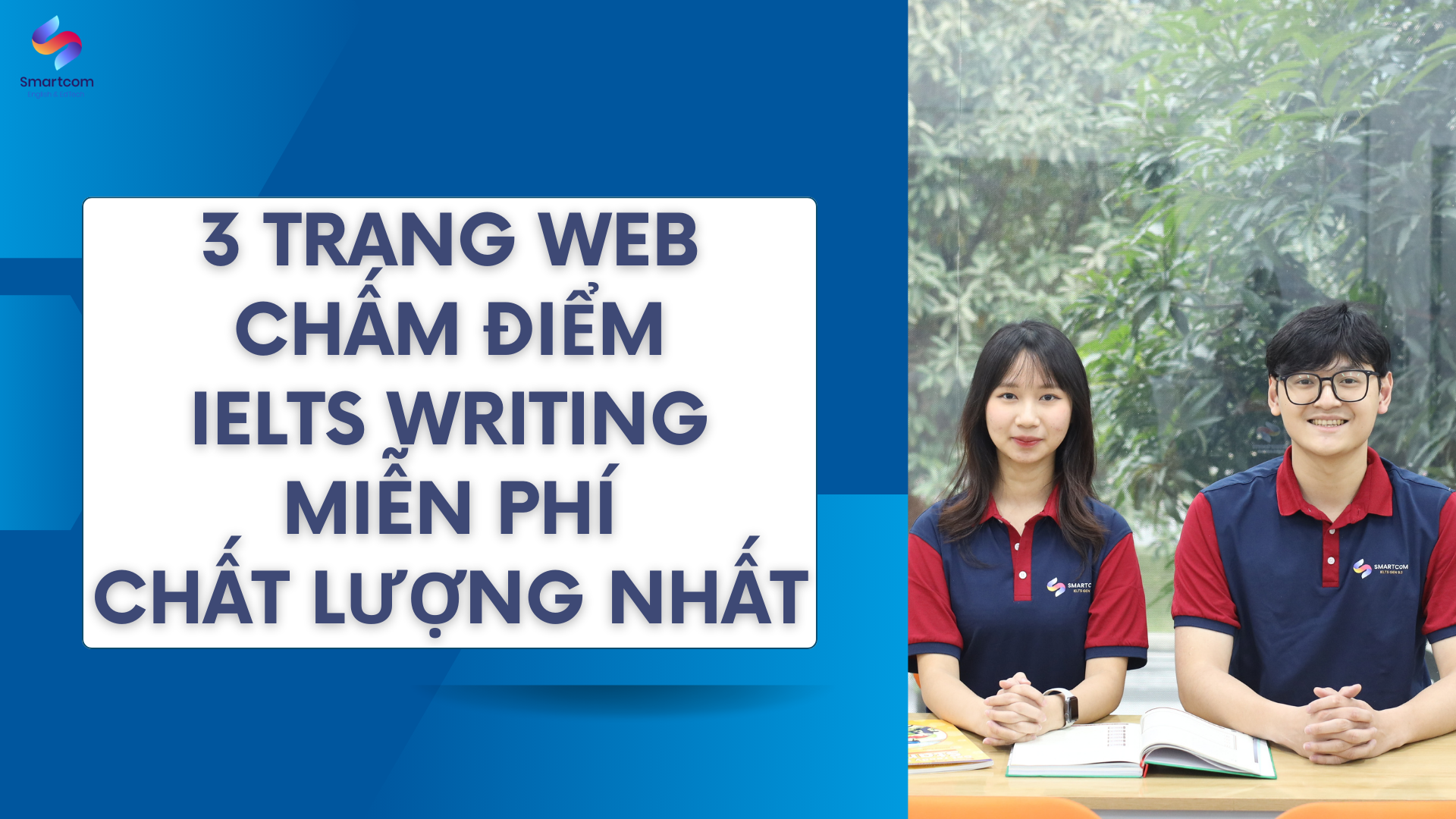
![[PDF + Audio] Tải Sách IELTS Cambridge 17 (Kèm đáp án)](https://smartcom.vn/blog/wp-content/uploads/2024/07/sach-ielts-cambridge-17_optimized.jpg)
![[PDF + Audio] Tải Sách IELTS Cambridge 15 (Kèm đáp án)](https://smartcom.vn/blog/wp-content/uploads/2024/07/ielts-cambridge-15_optimized.jpg)
